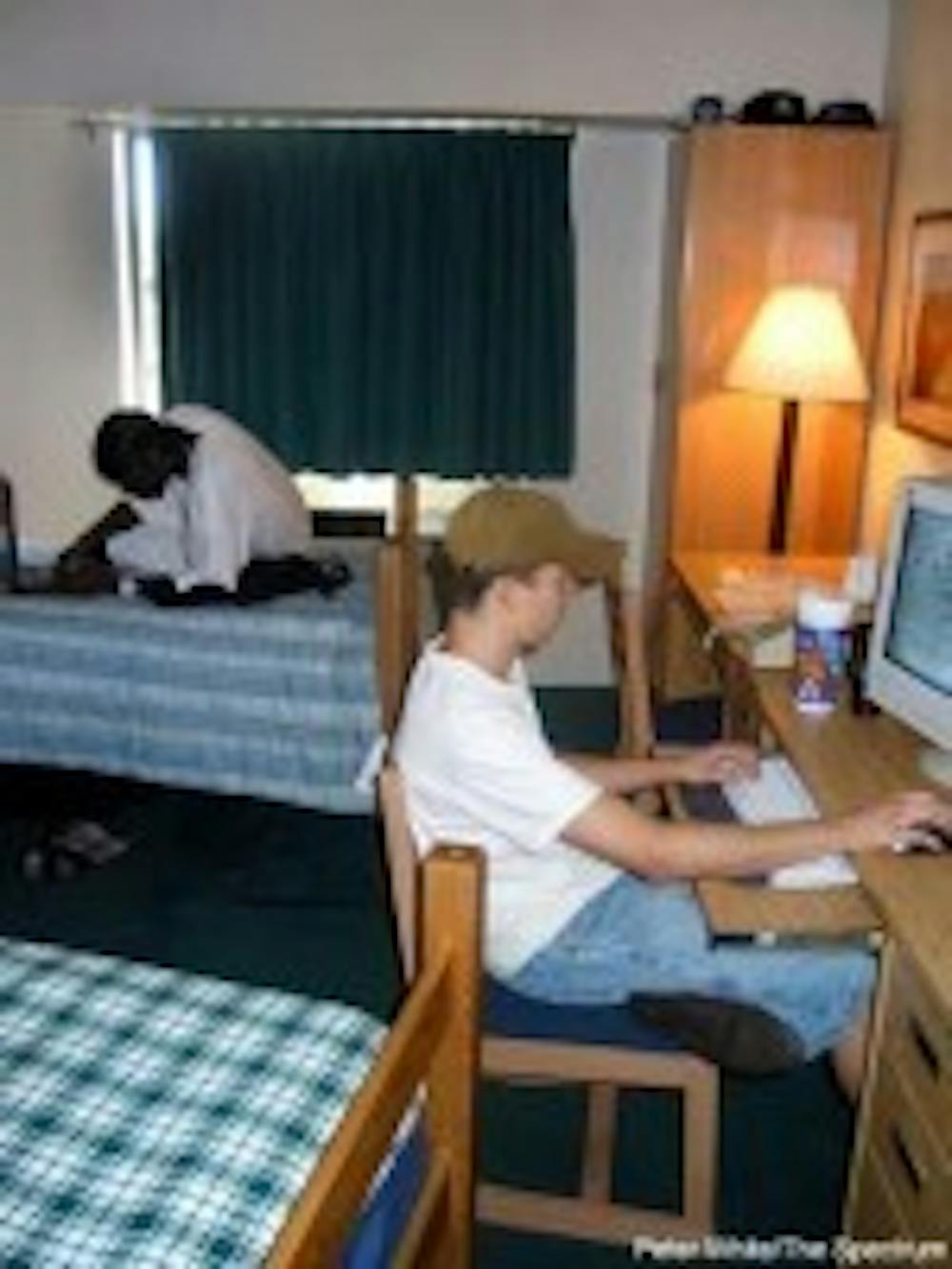A flood of freshmen and transfer students has forced UB officials to house 155 students in two local motels and a South Campus office building for the fall semester, until space is found in the residence halls.
Students are living in the Super 8 Motel on Flint Road in Amherst and the Microtel on Hospitality Center Way in Tonawanda.
UB officials also converted three floors of Michael Hall on South Campus, which houses the student medical center, to residential housing.
Joe Krakowiak, director of UB Residence Halls and Apartments, could not confirm a date by which students would move out of the hotels.
"It depends on what happens here," Krakowiak said. "We have a guarantee that as long as you're here, you can claim your spot with us."
Krakowiak said overcapacity students in the North Campus dormitories-for example, a fifth person in a quad in Ellicott-would be the first to get slots in open rooms.
Students in the hotels are paying the same double room rate that on-campus students are charged, he said.
At the Super 8, a brick and concrete structure next to a Citgo station on Flint Road, students seem satisfied with their surroundings.
"I actually dig it," said Nate Wall, a fine arts major who transferred from Monroe Community College. "The only downfall is the busses."
The University runs shuttles between the hotels and the university.
Wall lives on the fourth floor of the Super 8 with Jim Vesterling, a transfer from Erie Community College, and Tim Dickinson, also a transfer from MCC. An Italian flag and a poster from the film "Scarface" hang in their room.
In the hotel, as in all UB dorms, a resident assistant lives on each floor with the students. Two glittery nametags hang beside each door with the students' names on them.
While Dickinson and Vesterling appreciate the air conditioning, they said meals are inconvenient.
"Why would we go all the way to the dorms to eat bad food?" Dickinson said. "Usually we just go out to fast food."
According to UB officials, hotel residents have access to meal plans and the UB computer network.
RHA officials said they believe UB students are happy in the temporary facilities.
"The rooms are big, and they're air conditioned," said Thomas Tiberi, associate director for university apartments. "We haven't had any complaints from [the students]."
At Michael Hall, offices for sexual education and environmental health were moved to make room for the students. The building, opened in 1955, was initially built as a dormitory.
To alleviate the housing crunch, UB is developing plans to construct two modular housing units near Richmond Quad in the Ellicott Complex.
Krakowiak said UB was consulting with GE Capital, Inc., the largest manufacturer of homes in the United States, to build the structures. He said the project would house 80 students.
Modular units are less expensive than traditional buildings, he said, since they are built on-site in a factory and later bolted together.
Many details remain sketchy, however, such as the timeline for the project and the design for the buildings. Krakowiak said that UB might end up exploring other options.
Each year UB accepts more students into the residence halls than space allows. According to Krakowiak, RHA has found permanent space for every student for the past 10 years.
"Just like an airline, we overbook," said Krakowiak. He estimated that students in temporary overcapacity would learn their status by Thursday or Friday.
Krakowiak downplayed concerns that hotel housing could be a yearly occurrence.
"We don't anticipate that," he said. "We're working right now to project fall 2004 figures."
Super 8 and Microtel landed their contracts with UB through a bidding system, according to Tom Tiberi, Facilities Director for RHA.
"We sent out bids to all local motels that fit our bid specs," he said. "For example, they had to be within six miles of campus and have a 24-hour front desk."
Four motels responded in the bid process. UB chose Super 8 and Microtel because they had the most competitive costs, according to Tiberi.
Krakowiak said UB's housing crunch would ease when the Lee Road complex, a development of housing and stores along Lee Road on North Campus, is completed.
He said the project could extend UB's housing capacity by 3,000 beds.
Krakowiak could not provide a target date for completion of the Lee Road project.
Aside from Lee Road, UB has no concrete plans to build more dormitories on campus. No dormitory has opened on campus since the Ellicott Complex in 1974.
Meanwhile, Vesterling is happy to remain at the Super 8.
"They told us we'd move out by the end of the semester," he said. "But I'd rather stay here than in the dorms."





